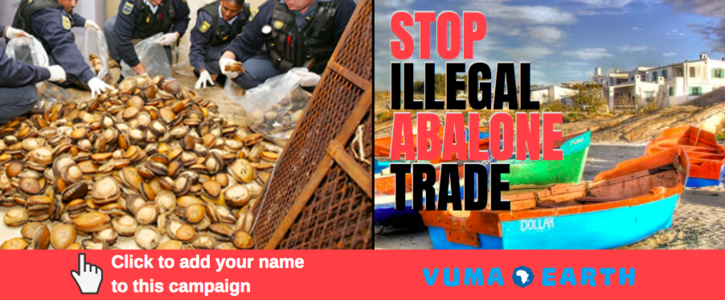1,000 signatures reached
To: South African Minister of Environment, Forestry and Fisheries - Ms Barbara Creecy
Stop Illegal Abalone Trade

We demand that you take all necessary measures to ensure the our people are no longer subjected to the hardship resulting from illegal abalone trade with the Far East. Deal with the corrupt public servants who benefit from the status quo as a first step.
Why is this important?
Shellfish abalone, known locally as “perlie” or perlemoen, is in high demand, particularly from the Far East. Abalone is heavily restricted, but illegal harvesting by organised criminal networks has caused stocks to plummet, dramatically impacting the legal abalone farming industry.
Abalone poaching has cost the country 96 million individual abalones worth R10 billion between 2000 to 2016 - and as a result, it is one of the inshore fisheries that faces collapse in South Africa.
Abalone poaching is highly illegal, carrying severe penalties. However, the level of desperation in Western Cape fishing communities is high. A lack of alternatives, compounded by the lure of easy money, drives many in the community to participate in illegal poaching activities.
Fishing communities are becoming increasingly poor and more vulnerable - and the WOMEN who live in these communities remain at the bottom of the food chain. The women’s economic dependence and vulnerability means they are regularly exploited by poachers and coerced into engaging in criminal activities, often with disastrous consequences.
What was once a thriving ecosystem of subsistence fishing has become a hotbed of criminal activity involving top government officials, who continue to benefit off regulations which make it imposable for small-scale fishermen to partake in trade of abalone legitimately.
Many women in the community have husbands, sons, partners and brothers who are engaged in illegal abalone poaching. Traditional engendered roles consequently entrap these women in supporting poaching activities by preparing food, cleaning wetsuits, storing catch bags in their freezers and permitting boats to park on their properties. They are vulnerable to gender violence, as in any setting immersed in criminality.
For more information -
https://www.groundup.org.za/article/want-curb-abalone-poaching-treat-cause/
https://theconversation.com/first-steps-to-tackling-south-africas-abalone-poaching-106957
https://www.news24.com/SouthAfrica/Local/Peoples-Post/fishing-communities-becoming-more-poor-20181119
https://ewn.co.za/2019/03/12/national-interventions-having-little-impact-on-abalone-poaching-report
https://www.dailymaverick.co.za/article/2018-12-14-former-poacher-reveals-uncomfortable-truths-about-stealing-from-nature-to-survive/
Abalone poaching has cost the country 96 million individual abalones worth R10 billion between 2000 to 2016 - and as a result, it is one of the inshore fisheries that faces collapse in South Africa.
Abalone poaching is highly illegal, carrying severe penalties. However, the level of desperation in Western Cape fishing communities is high. A lack of alternatives, compounded by the lure of easy money, drives many in the community to participate in illegal poaching activities.
Fishing communities are becoming increasingly poor and more vulnerable - and the WOMEN who live in these communities remain at the bottom of the food chain. The women’s economic dependence and vulnerability means they are regularly exploited by poachers and coerced into engaging in criminal activities, often with disastrous consequences.
What was once a thriving ecosystem of subsistence fishing has become a hotbed of criminal activity involving top government officials, who continue to benefit off regulations which make it imposable for small-scale fishermen to partake in trade of abalone legitimately.
Many women in the community have husbands, sons, partners and brothers who are engaged in illegal abalone poaching. Traditional engendered roles consequently entrap these women in supporting poaching activities by preparing food, cleaning wetsuits, storing catch bags in their freezers and permitting boats to park on their properties. They are vulnerable to gender violence, as in any setting immersed in criminality.
For more information -
https://www.groundup.org.za/article/want-curb-abalone-poaching-treat-cause/
https://theconversation.com/first-steps-to-tackling-south-africas-abalone-poaching-106957
https://www.news24.com/SouthAfrica/Local/Peoples-Post/fishing-communities-becoming-more-poor-20181119
https://ewn.co.za/2019/03/12/national-interventions-having-little-impact-on-abalone-poaching-report
https://www.dailymaverick.co.za/article/2018-12-14-former-poacher-reveals-uncomfortable-truths-about-stealing-from-nature-to-survive/

